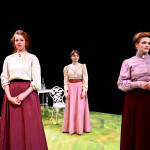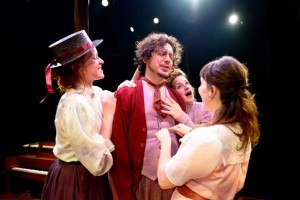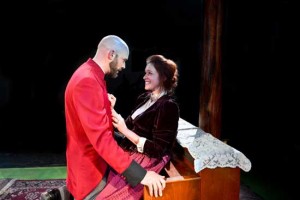
 [rating=4]The Hypocrite’s production of Anton Chekov’s “Three Sisters” is being billed as an adaptation, but Geoff Button’s version, though the dialogue is slightly modernized, is remarkably faithful to the Russian playwright’s script. It is showing at The Hypocrites new artistic home, The Den Theatre, which boasts two floors with elegant lobbies and bars, a huge complex of studios in which to present plays, and, on more than one occasion (including the night that I attended “Three Sisters”), a non-functioning cooling system which threatened to interfere with the illusion of a Russian Winter Circa 1900. Fortunately, Joseph Roller’s technical direction was able to overcome this possibly unforeseen challenge using theatrical lighting (William Kirkham) with rich, decadent, colors, an encroaching darkness, and shining sunlight; along with convincing, elegant props (Danielle Case); and a minimalist scenic (William Boles) that included the façade of birch trees in the background, creating the convincing ambience of a glamorous Russian home.
[rating=4]The Hypocrite’s production of Anton Chekov’s “Three Sisters” is being billed as an adaptation, but Geoff Button’s version, though the dialogue is slightly modernized, is remarkably faithful to the Russian playwright’s script. It is showing at The Hypocrites new artistic home, The Den Theatre, which boasts two floors with elegant lobbies and bars, a huge complex of studios in which to present plays, and, on more than one occasion (including the night that I attended “Three Sisters”), a non-functioning cooling system which threatened to interfere with the illusion of a Russian Winter Circa 1900. Fortunately, Joseph Roller’s technical direction was able to overcome this possibly unforeseen challenge using theatrical lighting (William Kirkham) with rich, decadent, colors, an encroaching darkness, and shining sunlight; along with convincing, elegant props (Danielle Case); and a minimalist scenic (William Boles) that included the façade of birch trees in the background, creating the convincing ambience of a glamorous Russian home.
During the course of the play, we experience the elegant formality of an upper-class dining room in the first act, the intimacy of a bed chamber balanced with the shades of darkness and nightmare that are quickly encroaching on their family in the second and third, and end in a stately garden: a green, outdoor, space with perfectly simulated bright sunlight in the fourth. The eponymous sister’s: Olga (Mary Williamson), Masha (Lindsey Gavel), and Irina (Hilary Williams) are all done up in convincing, if modest, turn of the century Imperial Russian garb (Costume Designer: Jeremy Floyd), and all three actresses give convincing and impeccably skilled, classical performances (despite the “adapted script”) to match the world so carefully prepared for them by the play’s technicians. 
Williamson is strong, eloquent, matriarchal, tender, and resigned, as the oldest sister Olga, as though her character alone sees the impossibility from the beginning of the family returning to Moscow in the summer as is planned: the even, upon which for some reason the three sisters have placed all their hopes, almost from the very beginning. She is the sad-but-wise “spinster” who, if she had it do all over again, would not need to fall in love before marrying her suitor if he were an “honorable and decent man.” In this, she is a foil to Masha who is lovely, delicate, trapped, and unhappy in her marriage to the thoroughly decent, if somewhat comic, Fyodor Kulygin (D’Wayne Taylor), for whom she feels no affection. Gavel’s movements, glances, voice, and delivery are strong and clear, but by no means overdone.
Nevertheless, she is able to convey an intensity to her character’s unhappiness and a predisposition to try and escape her marriage even before her foredoomed attempt begins and reaches its culmination in the visceral end of the play’s final act. The youngest daughter, Irina (Hillary Williams), may have some youthful enthusiasm in the first act but is vulnerable from the beginning—her name day is the anniversary of her father’s death (Chekov’s characters are marked by a predetermined stasis in a changing world). She captures the fragility of her the character, shuddering in the presence of her cruel sister-in-law Natasha (Erin Barlow: who captures cruel and self-centered perfectly, but whose performance lacks the nuance of the actresses playing the title characters), and crying on Olga’s lap over her inability to fall in love.
For the most part, the male actors do not fare as well, especially the soldiers, who give universally bland performances. While hardly desirable, this doesn’t mar the production to the degree that one might expect as Chekov has made their character’s behavior simultaneously ridiculous and perfectly explicable. When the military battlement shows up in the first act, symbolic emissaries from the world of Moscow, Major Vershinin (Vance Smith), who is married to a woman with a history of suicidal threats, gestures, and possible attempts (it’s not really clear); has children by her; and had an acquaintance with the sisters’ father, forms a romantic attachment to Masha: the one sister who is also married and unhappily at that. Baron Tuzenbach (Noah Simon), Solyony (John Kahara), and Fedotik (Ned Baker) all pursue Irina rather than the more mature Olga who is only twenty-eight, strong, and still somewhat eligible at the play’s beginning. Their interest is unrequited, but the three actors convey no sense of suffering, despite the fact that the most drastic interpersonal event of the play centers on their competition over their affections for her. Likewise, Joel Ewing as Andrei, the sister’s brother, never conveys the intense shame over his gambling addiction and decision to mortgage their house without his sister’s permission although he does fare much better at showing his frustration with his wife with rhapsodizing monologues about her in which he does a good job highlighting the barely concealed irony.
D’wayne Taylor does give a suplerlative performance as Masha’s husband, Fyodor Kulygin, who flawlessly balances his semi-ridiculous behavior with the intense integrity and kindness which Masha seems almost to resent, making her unhappiness all the more intense and tragic, and Bill McGough is well cast as the army doctor Chebutykin. He is convincingly comic, forgetful, and wistful, especially when he talks about being in love with the sisters’ mother, but he seems afraid of over-acting the existentialist stupors which Chekov has deliberately have set out from the other of the monologues in play, which insist on some ultimate meaning, probably indicating that the doctor’s are crucial to the plays understanding and effect, and should not be shied away not be shied from by the actor. Much of the discourse of the play is about what it means that the three sisters now work for a living when they weren’t brought to it, and if their labor and suffering (which Chekov makes clear are two very different things), will make the world better in two hundred years or so or whether life will continue the same as it always has. The answer, of-course, is neither. Big changes were coming to Russia, especially for the bourgeois and aristocratic classes, and even the most committed of Marxists would say that the revolution was ultimately and quickly betrayed, and a reign of totalitarian terror ushered in. Chekov could hardly have fully known this, of course, but Button does, and he plays up Fedotik’s use of the camera with great effect, drawing attention to the moment in the last act where he asks Irena to pose for something he could look at in “fifteen years-time” It becomes a final portrait not just of the young Irina, but of life in imperial Russia: much like the play itself.
Chekov’s characters may not be able to change, but the world around them was changing, and shortly after this play, would change in the most dramatic ways. Ultimately, with a high degree of success, Button is able to turn the play into a sort of time capsule without ever shying away from Chekov’s themes or psychologist insights. “The Three Sisters” is playing through June 6th at the Den Theatre, located at 1329 N. Milwaukee Avenue. Performances are Monday, Friday, and Saturday at 8 pm, and Sunday at 3 pm. 28 dollars for regular tickets. They can be purchased at www.thehypocrites.com
To see what others are saying, visit www.theatreinchicago.com, go to Review Round-up and click at “Three Sisters”






More Stories
“Dummy in Diaspora”
“The Magic School Bus: Lost in the Solar System”
“February House” reviewed by Julia W. Rath